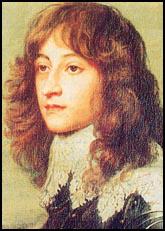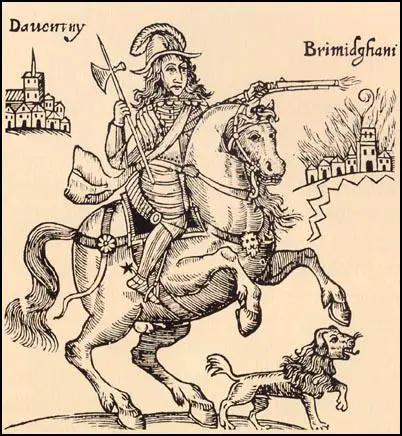Prince Rupert

Prince Rupert, the third son of Frederick, the King of Bohemia, was born in Prague in 1619. The grandson of James I, Prince Rupert fought for the Dutch army during the Thirty Years War until he was taken prisoner at Vlotho.
After his father was deposed he settled in England in 1635. On the outbreak of the Civil War Prince Rupert was put in charge of the cavalry. He introduced a new cavalry tactic that he had learnt fighting in Sweden. This involved charging full speed at the enemy. The horses were kept close together and just before impact the men fired their pistols.
During the early stages of the Civil War the parliamentary army was at a great disadvantage. Most of the soldiers had never used a sword or musket before. When faced with Prince Rupert's cavalry charging at full speed, they often turned and ran.
One of the Roundhead officers who saw Prince Rupert's cavalry in action was Oliver Cromwell. Although Cromwell had no military training, his experience as a large landowner gave him a good knowledge of horses. Cromwell became convinced that if he could produce a well-disciplined army he could defeat Prince Rupert. He knew that pikemen, armed with sixteen-foot-long pikes, who stood their ground during a cavalry attack, could do a tremendous amount of damage.
Oliver Cromwell also noticed that Prince Rupert's cavalry were not very well disciplined. After they charged the enemy they went in pursuit of individual targets. At the first major battle of the civil war at Edgehill, most of Prince Rupert's cavalrymen did not return to the battlefield until over an hour after the initial charge. By this time the horses were so tired they were unable to mount another attack against the Roundheads. Cromwell trained his cavalry to keep together after a charge. In this way his men could repeatedly charge the Cavaliers.

In 1644 Prince Rupert was given the title the Duke of Cumberland and was made Commander in Chief of the Royalist forces. In 1645 Prince Rupert was forced to surrender Bristol to the Parliamentary army. Charles I was furious and dismissed him from office. However, Prince Rupert resumed his duties after being acquitted at his court martial.
In 1646 Prince Rupert surrendered at Oxford to General Thomas Fairfax. Expelled from England by Parliament, Rupert took command of the Royalist fleet in 1648 and for the next two years attacked English shipping. After being defeated by Admiral Robert Blake he escaped to the West Indies. In 1653 he went to live in France.
Prince Rupert returned to England in 1660 with Charles II and during his later years was an active member of the Royal Society and in 1670 helped establish the Hudson's Bay Company. Prince Rupert died in 1682.
Primary Sources
(1) Joshua Sprigge was General Fairfax's chaplain. Later he wrote an account of the battle at Naseby.
Prince Rupert chased the left-wing almost to Naseby town... The Prince, probably realising by that time the success of our right-wing cavalry... he raced to the rescue of the King's army, which he found in such distress, that instead of attempting to rescue them... he went to look for the King... The prisoners taken in the field were about 5,000... The whole booty of the battlefield was given to the soldiers, which was very rich and considerable... besides the riches of the court and officers, there was also the goods stolen from Leicester.
(2) Edward Walker was a member of the Royalist cavalry at Naseby.
The first charge was by Prince Rupert and his troops... The infantry only made one volley... they were soon in great disorder.
(3) Sir Richard Bulstrode served in the Royalist army at Edgehill.
Just before we began our attack, Prince Rupert passed from one wing to the other, giving orders to the cavalry, to march as close as possible, to receive the enemy shot, without firing our pistols, till we broke in amongst the enemy... after a small resistance... we were masters of their cannon... Prince Rupert... eagerly pursued the (right-wing of the parliamentary cavalry), who fled... if we had only kept our ground after we had beaten the enemy, and not left our foot naked to their cavalry... we might have made an end of the war.
